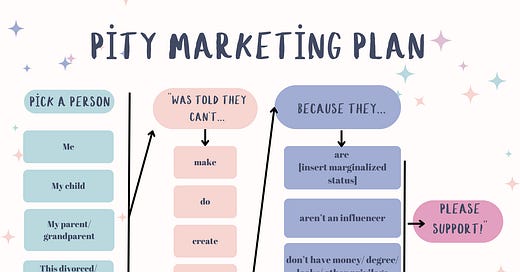See you tonight!
Authors' Meeting - ANBIP
Event Invite
Saturday, January 25, 2025 · 5:00 PST / 6:00 MST / 7:00 CST / 8:00 EST
Video call link
Feature:
Should you tell a sob story?
An article in The New Stateman is called “The Rise of Pity Marketing: On social media, the sob story has become a successful strategy for struggling artists bidding for virality.”
I get it—you tell an emotional story, go viral, and sell books. I see it all the time. It’s so obvious that even spambots and AI scammers use it!
If you’re not a scammer, is Pity Marketing a good strategy to sell your books? Here are some things to consider.
Sometimes, YES.
Pity and anger did get a sale out of me recently: I bought a workbook that I had seen a few ads for, that I had already been thinking about buying for a year, and that was finally on sale. What pushed me over to buy it was the fact that I had seen so many counterfeit versions for sale. I was annoyed at the perpetrators of the IP theft, and wanted to support the actual author—because I wanted to counter the injustice. (Notably, the author didn’t really lean into pity marketing; I just witnessed the counterfeits being sold with my own two eyes.)
(FYI, it was the Anti-Planner, on sale at the official website here. Honestly, please do not buy illegal copies, it really harms creators.)
Now, is it smart to share your “woe is me” issues? Maybe. Consider the pros and cons:
Reasons why you SHOULD share your struggles as a creative online:
I’ve seen it work! At least in the short term.
It’s nice to have community support.
It’s good when a legitimate injustice is addressed and sometimes even rectified by a supportive community.
Pointing out problems with creative fields can lead to improving them. Maybe your issue is actually a systemic problem that will spark a conversation about how to mitigate it!
Your story is yours to “exploit” as much as you want. I mean, that’s a fairly big point of writing memoirs. In journalism, we say, “If it bleeds, it leads.” If you want to make something positive out of your own bad experience, that’s 100% your right.
Drama can be directly profitable…drama can mean views, and views can mean money on monetized videos and/or sales.
Sharing your struggles can help others with the same problems feel less alone and possibly assuage feelings of guilt for perceived personal failures. It’s like the Instagram effect where, supposedly, people feel bad when their friends only share vacation photos as though their lives were only vacation. (I’m fine with that too, I’m just saying that including some struggles can help people get a more rounded, accurate view of their community members.)
Even if you don’t have anything to sell, it’s therapeutic to read hundreds of comments supporting and validating that what you experienced sucks. If someone wronged you, it’s really nice to hear from others that your experience was anomalous; most people would never do you dirty like that! We don’t actually live in a world in which everyone is that evil! (Or, if we do, then you ought to know about that as well, to prepare.)
You can learn from others who experienced similar things or who can help you understand what happened and/or how to respond, and vice versa.
Reasons why you should NOT share your sob story publicly:
Some are lies or misleading. Don’t lie.
When you put your business out, your business is out. Complaining that you’re getting “judged” for the thing you brought up is kind of like complaining that people can see and comment on your feet when you go barefoot in public. It’s going to happen.
You might not like their judgments. They might think you’re just whiny. They might be right or wrong, but either way, they might hate you.
Maybe you’re absolutely right in your concern and not being whiny at all, but the situation is too complex and petty to get anyone on your side.
You could harm anyone you’re naming and shaming, so you had better be 100% sure they deserve it and that there was no better way to hold them accountable before committing to bringing it up in public.
If you’re not sure what you’re saying is right, you could be committing libel or slander, which are both morally wrong and grounds for a lawsuit.
You could get yourself blacklisted from jobs, contracts, etc., for offending the wrong people. IDK how often that happens, but it happens.
Lower-risk alternatives to public discourse
Keep reading with a 7-day free trial
Subscribe to ANBIP’s Substack to keep reading this post and get 7 days of free access to the full post archives.




